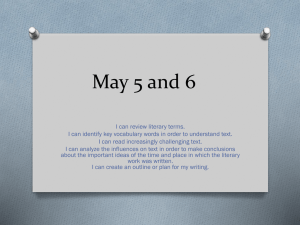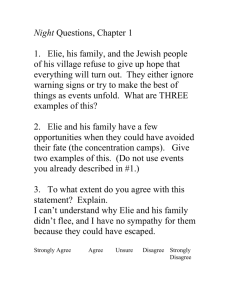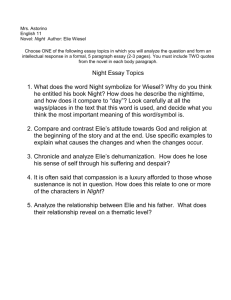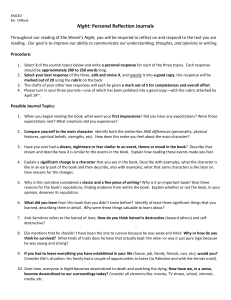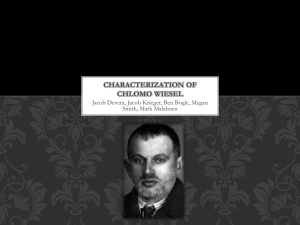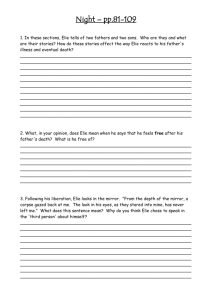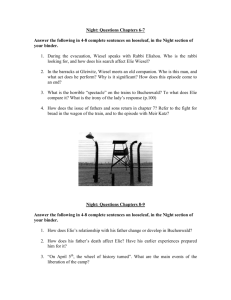Night Annotations
advertisement
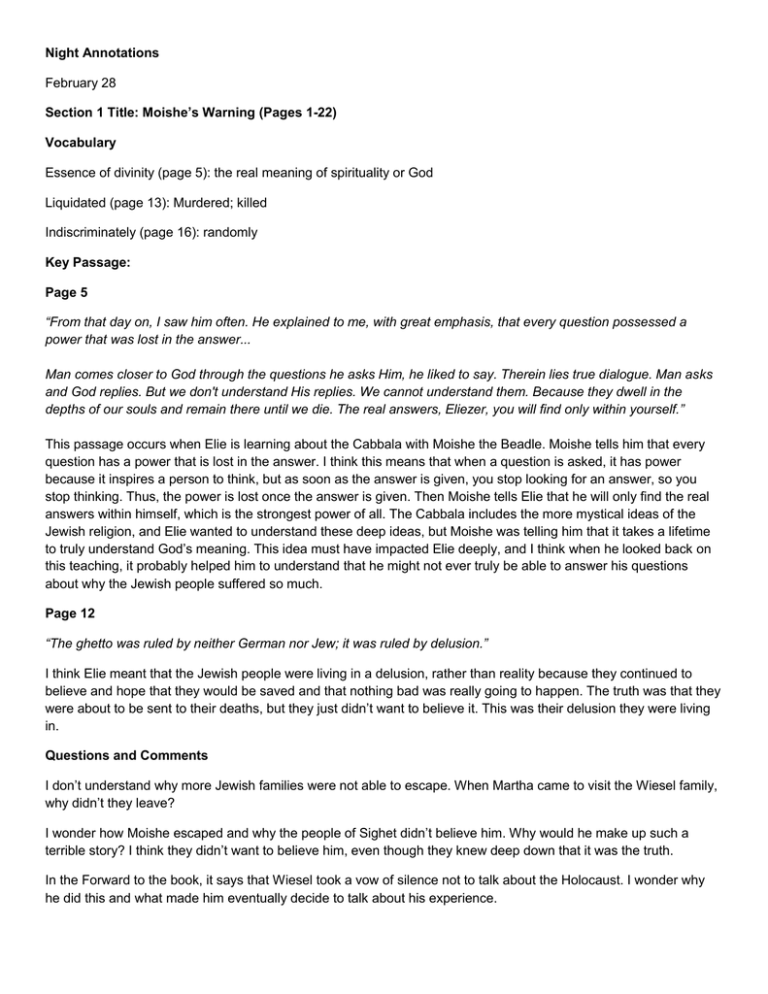
Night Annotations February 28 Section 1 Title: Moishe’s Warning (Pages 1-22) Vocabulary Essence of divinity (page 5): the real meaning of spirituality or God Liquidated (page 13): Murdered; killed Indiscriminately (page 16): randomly Key Passage: Page 5 “From that day on, I saw him often. He explained to me, with great emphasis, that every question possessed a power that was lost in the answer... Man comes closer to God through the questions he asks Him, he liked to say. Therein lies true dialogue. Man asks and God replies. But we don't understand His replies. We cannot understand them. Because they dwell in the depths of our souls and remain there until we die. The real answers, Eliezer, you will find only within yourself.” This passage occurs when Elie is learning about the Cabbala with Moishe the Beadle. Moishe tells him that every question has a power that is lost in the answer. I think this means that when a question is asked, it has power because it inspires a person to think, but as soon as the answer is given, you stop looking for an answer, so you stop thinking. Thus, the power is lost once the answer is given. Then Moishe tells Elie that he will only find the real answers within himself, which is the strongest power of all. The Cabbala includes the more mystical ideas of the Jewish religion, and Elie wanted to understand these deep ideas, but Moishe was telling him that it takes a lifetime to truly understand God’s meaning. This idea must have impacted Elie deeply, and I think when he looked back on this teaching, it probably helped him to understand that he might not ever truly be able to answer his questions about why the Jewish people suffered so much. Page 12 “The ghetto was ruled by neither German nor Jew; it was ruled by delusion.” I think Elie meant that the Jewish people were living in a delusion, rather than reality because they continued to believe and hope that they would be saved and that nothing bad was really going to happen. The truth was that they were about to be sent to their deaths, but they just didn’t want to believe it. This was their delusion they were living in. Questions and Comments I don’t understand why more Jewish families were not able to escape. When Martha came to visit the Wiesel family, why didn’t they leave? I wonder how Moishe escaped and why the people of Sighet didn’t believe him. Why would he make up such a terrible story? I think they didn’t want to believe him, even though they knew deep down that it was the truth. In the Forward to the book, it says that Wiesel took a vow of silence not to talk about the Holocaust. I wonder why he did this and what made him eventually decide to talk about his experience. Connections On page 9 Elie mentions that the Fascist government took over in Hungary and began to impose restrictions on the Jewish people in Sighet. The town leaders were arrested, there were curfew laws, their possessions were confiscated, and they had to wear the yellow star. I have learned about the Nuremberg Laws in Germany that the Nazis enacted against German Jews so that they were not allowed to marry other Germans and they weren’t given equal rights of citizenship. Gradually, their rights were restricted more and more. On page 20 Maria, their old servant, offered to hide the Wiesel family in her village. I have heard about Jewish families hiding during the Holocaust to avoid being sent to the concentration camps. I have read The Diary of Anne Frank. It is about a young girl and her family who hide in a sealed off back room of the father’s office building. She was about Elie’s age, but her family was discovered eventually and they were sent to a concentration camp. She kept the diary up until the day they were discovered, and the diary was later found and published. Motifs Night Night is the title of the book. Page 12 “Night fell. Some twenty people had gathered in our courtyard. . .Despite the growing darkness, I could see my father turn pale.” Page 21 “Night. No one was praying for the night to pass quickly. The stars were but sparks of the immense conflagration that was consuming us. Were this conflagration to be extinguished one day, nothing would be left in the sky but extinct stars and unseeing eyes.” Silence Page 8 “Even Moishe the Beadle had fallen silent. He was weary of talking.” Page 14 “Again, heavy silence. . . The shadows around me roused themselves as if from a deep sleep and left silently in every direction.” Father/Son relationship Page 7 “. . .and that of Tobie, the tailor who begged to die before his sons were killed.” Sacrifice Page 4 “My father was a cultured man . . .and was more involved with the welfare of others than of his own kin.” Elie’s father sacrificed for the community. Page 7 “They think I’m mad,” . . .”You don’t understand . . . I succeeded in coming back. Where did I get my strength? I wanted to return to Sighet to describe to you my death so that you might ready yourselves while there is still time.” Moishe the Beadle sacrificed in hopes of saving the people of Sighet. Faith Page 3 “I was almost thirteen and deeply observant. By day I studied Talmud and by night I would run to the synagogue to weep over the destruction of the Temple.” Page 5 “I became convinced that Moishe the Beadle would help me enter eternity, into that time when question and answer would become ONE.” Elie becomes very interested in learning about his faith early on. He asks Moishe the Beadle to teach him about the Cabbala. Section 1 and 2 Characters Elie: He is the narrator of the book. He is 12 years old, and a very faithful young boy. He wants to study the Cabbala, and he finds a mentor in Moishe. Elie’s Father (Chlomo): He is a leader of the Jewish community in Sighet and Elie’s father. He stands strong for the community. He also doesn’t want to leave his homeland when he is offered refuge by his old servant Martha. Moshe the Beadle (page #): He is Elie’s teacher of Jewish mysticism. He is a poor Jewish man who works at the synagogue in Sighet. Because he was a foreign Jew, he was deported first, but he escaped and returned to Sighet to tell the others what happened. They were shipped out on a train, but then they were made to stop and dig their own graves before they were shot. Many of the people in Sighet thought he was crazy and they didn’t believe him. Dr. Josef Mengele: He was the doctor who was in charge of the selection process at the concentration camps. He determined which prisoners were selected for the work camps and which ones were to be put to death in the gas chambers. Hilda, Bea, and Tzipora: Elie’s sisters. We don’t learn very much about them. Madame Schächter: A woman who is deported in the same cattle car with Elie. She goes crazy and starts screaming that she sees fire, and the others think she is crazy. When they arrive at Auschwitz and see the smoke from the crematoriums, they realize that she was foreseeing their doom.
